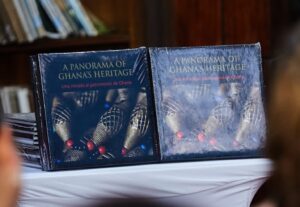The Spanish Embassy in Ghana has launched a book on Ghana’s heritage, with a call for collaboration and innovation to preserve and promote the country’s heritage. The book which is funded by the Spanish Agency for International Development Cooperation (AECID), is a joint initiative by UNESCO, the Embassy of Spain and the Ministry of Tourism, Arts and Culture of Ghana.
Titled ‘A Panorama of Ghana’s Heritage’, the 110 page book is the second edition. The first edition was published in 2012. Written in both English and Spanish, the book is divided in two parts. The first part features images of Ghana’s heritage with historical and cultural annotations according to the various regions, and the second part featuring notes on the images presented in the first part.

Speaking at the launch at the George Padmore Library in Accra, the Deputy Minister for Tourism, Arts and Culture, Mark Okraku Mantey noted that, there was a need for collaboration and innovation to preserve and promote Ghana’s heritage.
Commending UNESCO and the Spanish government for their collaborative involvement in bringing the book to fruition, Mr. Mantey indicated that the book was undoubtedly a key tourism promotion tool kit, stating that “the Ministry of Tourism, Arts and Culture intends to utilise as a tool to advance the goals of the sector.”
According to him, the book represents a collaborative commitment between UNESCO and the Spanish government documenting Ghana’s heritage for preservation and posterity. “This is a testament to UNESCO and the Spanish government’s long-term dedication to Ghana.”
Mr. Mantey who was speaking on behalf of the sector Minister called for more of such initiatives, where local and international partners can join forces to protect and promote Ghana’s cultural heritage.

In his welcome address, the Spanish Ambassador to Ghana, Javier Gutierrez said, the book seeks to reflect on the best way to strike a balance between the need to preserve Ghana’s impressive heritage and the urgency to generate new look infrastructure, including residential, particularly in urban areas. He said the Spanish government hopes to raise awareness and mobilize efforts to use heritage as an engine for growth.
He indicated that with the requisite collaboration, good investment and cultural preservation, Ghana could attract more visitors into the country and generate wealth.
Citing some landmark buildings such as the Kwame Nkrumah Memorial Park, the Centre for National Culture, Old Parliament House, James Town Light House and the Supreme Court, all located on the High Street in Accra, Mr. Gutierrez, said those buildings were monuments that would be attractive for many people, especially for Europeans including Spaniards.
He said the High Street area could attract many visitors to come to Ghana which would in turn generate development. Highlighting the importance of international cooperation in cultural preservation, Mr. Gutierrez indicated that they would engage relevant stakeholders and facilitate a debate with the hope of documenting the beauty of Ghana, noting that the book is an overview of Ghana’s heritage.
The United Nations Resident Coordinator in Ghana, Charles Abani, said, the United Nations Educational, Scientific, and Cultural Organization (UNESCO), is working tirelessly to preserve cultural heritages around the globe. He noted that these heritages do not only reflect the past but serve as means to economic and sustainable development.
Historical significance
Stressing the need for all to join hands together to safeguard Ghana’s cultural heritage, he mentioned that Ghana’s rich historical and cultural treasures do not only hold historical significance but also serve as catalysts for economic development.
Mr. Abani who commended Ghana for its unwavering commitment to preserving its heritage, stated that conscious efforts must be to safeguard it for generations to come.
“Let us ensure that we tap into the wealth of the national heritage elements to bring wealth while preserving them for posterity. Our cultural heritage is not just a significant graph but a beacon of a brighter future. It is a sense of belonging and purpose,” he added.

Vibrant force
For his part, he UNESCO Representative to Ghana, Edmond Moukala N’Gouemo, said Ghana’s cultural legacy was a vibrant force for sustainable development and by involving local communities in the decision making process and utilising traditional knowledge systems, it would be able to promote economic development that are based on cultural pride and environmental responsibility.
He advocated for a continuous collaboration to value and guard the world’s heritage by working together to create thriving and welcoming communities where common history becomes a motivation to fashion a better future using our creative and ethical method and employing new technologies.
Besides showcasing the diverse and rich traditions of Ghana, from colonial to the modern-day cultural practices observed across the nation, the book also marks a significant contribution to Ghana’s literature on cultural heritage. Present at the ceremony were cultural enthusiasts, and members of the diplomatic community.










